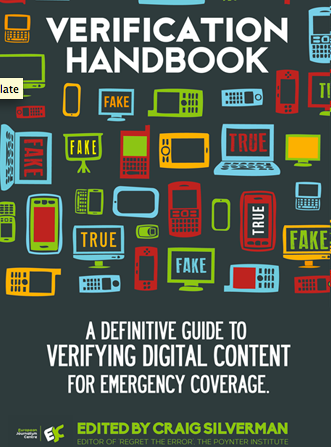New Reference Resource: Internet Verification Handbook Released (Free Online)
Here’s a new handbook published today (available for free) by the European Journalism Center in the Netherlands and edited by Craig Silverman from The Poynter Institute in St. Petersburg, Florida.
Journalists AND Librarians
Although the book targets journalists working to verify information during the coverage of an emergency many of the tools and techniques discussed will be of interest and value to information professionals and our users.
Verification, credibility of information has always been a very key part of both both librarianship and journalism. Now, with the rapid growth of social media it takes on even more importance and is an essential part of digital literacy. Social media is both a blessing (anyone can have their say) but also a challenge for the same reason. With the volume of data and information available (and expanding) and given how fast it can travel on the web the skills to verify what one reads and views have never been more important. These skills must not only be taught but also updated on a regular basis as new services go live.
We often talk and write about the synergies and similarities between librarianship and journalism. This has never been more true in the Internet age.
I have been speaking to journalists at seminars and one-on-one about research issues, techniques and tools; both online and print) for 16 years and they’re almost always appreciative of what I have to say and the resources I share.
In fact, reaching out to journalists in your community might be a worthwhile idea to let them know you’re library and librarians are there to help if needed. It might also be a great opportunity to not only talk about but demonstrate the resources the library offers to the community 24x7x365. It has been my experience that many journalists are unaware of what libraries in their communities offer these days.
Back to the New Book
From the EJC:
Whether it is debunking images of ‘street sharks’ during Hurricane Sandy, or determining the veracity of videos that depict human rights abuses, reporting the right information is critical in shaping responses from the public and relief workers as a crisis unfolds.
By providing the exact methods needed to validate information, photos and videos shared by the crowd, the Verification Handbook forms an essential component of any organisation’s disaster preparedness plan.
The Verification Handbook draws on the experiences of practitioners from some of the world’s premier news and aid organisations, including BBC, Storyful, The Guardian, ABC, Buzzfeed UK, NHK, Poynter Institute, Digital First Media, the Tow Center, GigaOM, the Qatar Foundation’s Computing Research Institute (QCRI), the Internews Center for Innovation & Learning, OpenStreetMap, Amnesty International, Circa, Meedan, the United Nations Alliance of Civilizations (UNAOC), WITNESS, the Dart Centre Europe, and Shabab Souria.
The full text is available free online.
PDF, Kindle, and print versions will be released on February 7, 2014.
Filed under: Data Files, Libraries, News, Patrons and Users
About Gary Price
Gary Price (gprice@gmail.com) is a librarian, writer, consultant, and frequent conference speaker based in the Washington D.C. metro area. He earned his MLIS degree from Wayne State University in Detroit. Price has won several awards including the SLA Innovations in Technology Award and Alumnus of the Year from the Wayne St. University Library and Information Science Program. From 2006-2009 he was Director of Online Information Services at Ask.com.



